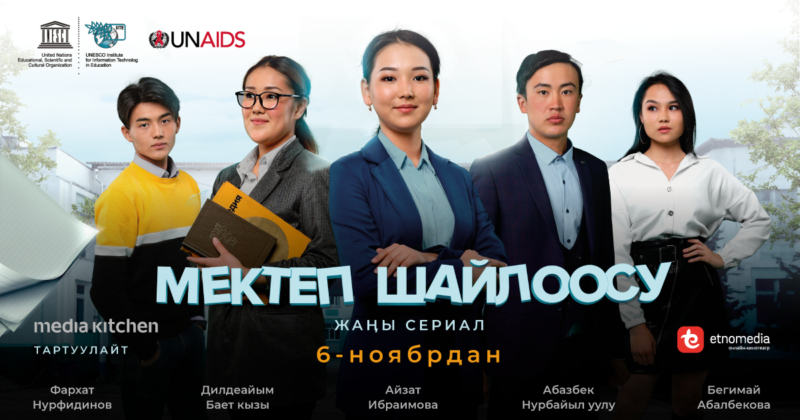School Elections, a new television series produced by the Media Kitchen studio with support from UNESCO IITE and UNAIDS, can be viewed online and on Kyrgyz national television starting on 6 November 2020. This show is the first interactive series in the Kyrgyz language about today’s school, living with HIV, peer rivalry, and the fight for justice. Featuring an unexpected competition between two candidates for school president, six short episodes tell the story of bullying, true friendship and human dignity and present school elections as a symbol of modern society in miniature.
Story
The 17-year-old Ayana Erkebaeva is an 11th grade student who believes in social activism and fighting for justice. Ayana lives with HIV but cannot tell anyone about it. Unfortunately, getting into trouble is her middle name. An unfortunate incident forces Ayana to move to a new school, where she is faced with the harsh reality of bullying from day one. Altynbek, a silver spoon boy who is the school’s current president, sets his own rules and enforces them together with his “gang,” keeping everyone on their toes. But next school elections are upcoming, in which a mysterious new candidate will challenge Altynbek’s authority for the first time ever…
The first episode of the series was aired at 7pm on November 6 on Ethnomedia, Kyrgyzstan’s leading online movie theater featuring film industry novelties in the Kyrgyz language. The first episode has already generated over 280,000 views and thousands of positive comments.
What we know about the new series
New episodes are aired each Friday on Ethnomedia’s YouTube channel and then on the teens.kg youth project’s Instagram and the NTS national television channel. The series consists of six 15- to 20-minute episodes, featuring promising young actors, many of whom are seen on screen for the first time.
The series shows the story of a teenage girl living with HIV and facing numerous challenges due to her HIV status. Her story unfolds in a setting which is well-known and relatable to many Kyrgyz youth, such as rivalry for school presidency, fight for justice, and confrontation between the “powerful” and those seen as “powerless,” which often leads to bullying those perceived as “different.” This approach makes it possible to educate viewers, in a natural and unobtrusive manner, about various aspects of living with HIV as well as HIV treatment and prevention, while at the same time addressing everyday problems which students may face.
Azim Azimov, Head of Production at the Media Kitchen studio and main screenwriter of the series:
“At first, we seemed to be writing a series about HIV. Then the outlines of a political thriller started to emerge, with elections, candidates and compromising evidence involved. But ultimately, a very simple idea came to the fore. You may differ from others in your health, appearance or level of wealth. But regardless of this, we all deserve respect, friendship, love and happiness. This series is about kindness and acceptance of others the way they are“
The official soundtrack designed to convey the mood of the series is the song “Baratam” (“I’m moving forward” in Kyrgyz) performed by the popular singer Ayim Ayilchieva. She also released a music video to support the show’s launch.
The first interactive series in the Kyrgyz language
A special feature of School Elections are additional interactive episodes in which the leading actors invite viewers to explore the issues raised in the series from their own perspective, to imagine themselves in various situations and to make their own choices. The interactive episodes accompanying the first show feature Aizat Ibraimova as Ayana reflecting on the antiretroviral therapy and its effectiveness, on whether the stereotypes about HIV are relevant in the 21st century, and whether bullying can be tolerated even when it targets someone who initiated it in the first place.
Each episode of the series is accompanied by one to three interactive features which can be viewed either as a regular video on Ethnomedia or as an Instagram story on teens.kg allowing users to vote and comment. Subtitles in Russian are available for all episodes and interactive features of the series.
Meerim Sarybaeva, UNAIDS Country Director for Kyrgyzstan:
“This series is particularly important for us because it does not only highlight the challenges of living with HIV, facing discrimination and bullying, but also motivates adolescents to dare to be different from peers and independent of other people’s opinions, to set goals, to fight for justice and for their rights, to be a better and more compassionate person, and to move forward“
The bullying theme: more important than it looks
The serial’s launch is timed to coincide with the International Day against Violence and Bullying at School Including Cyberbullying, declared by UNESCO in 2020. According to UNESCO, more than 30% of students worldwide have been bullied in various ways by peers at school. The main reason for bullying is being perceived as “different” in terms of physical appearance, health status (including HIV), sexual orientation, gender identity, or the social standing or economic situation of one’s family.
The series’ main character is bullied by peers at school but finds the strength to resist and to win, thanks to support from friends and family and her own belief in doing the right thing. The show producers hope that her example as well as the overall story presented in the series will inspire many teenagers and young people facing similar challenges.
Tigran Yepoyan, UNESCO Regional Adviser on HIV, Education and Health:
“This series is our first experience of telling people about complex issues in a simple and relatable manner and showing how strong-willed, honest and confident young people can overcome ignorance, indifference, cruelty and injustice, inspire others and change their lives for the better. Many thanks to the creative team, actors, colleagues from UNESCO and UNAIDS, the schools where the show was filmed, and to everyone whose efforts and support made this show happen”
